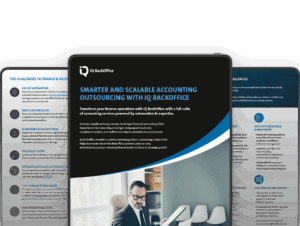
Introduction
In today’s world where technology and trade have made everyday living more interconnected and interdependent, outsourcing has emerged as a widespread trend touching many different sectors. It has become so widespread that in 2022 many businesses across industries chose to outsource their services to the tune of over $700 billion. Among these, accounting has seen a significant rise in outsourcing. This surge can be attributed to businesses’ quest for a strategically efficient and budget-friendly means to handle their financial operations. Yet, similar to any significant undertaking, the advantages are intertwined with specific inherent challenges (or opportunities), with data security being a particularly critical concern.
In the discussion ahead, we’ll navigate the common perceived risks that accompany Accounting Outsourcing. Our journey will lead us to discover prudent strategies that can effectively counter these supposed risks, fostering a resilient barrier of data security for your enterprise.
UNDERSTANDING THE PERCEIVED RISKS
Confidentiality Breaches
A key issue in Accounting Outsourcing is the risk of unauthorized individuals gaining access to sensitive financial data. Whether we’re talking about client particulars, vital financial reports, or even basic payroll information, any breach in maintaining this confidentiality can trigger grave repercussions. The fallout isn’t limited to just the organization itself; it extends its reach to impact the clients as well. This is a scenario where the stakes are high, and safeguarding trust is of utmost importance.
Data Theft and Fraud
When it comes to hiring a third party to perform any task – the need to expose any information opens it up to risk – in accounting data, it is plausible to connect this potentially to theft and fraud. This isn’t meant to sound alarmist but rather to highlight a genuine concern. You see, by entrusting financial data to external parties, there’s a chance—although a small one—that cunning individuals might exploit weak points in data transmission, storage, or processing. This could result in them sneaking their way into your confidential information, tinkering with financial records, or even committing the dreaded identity theft. It’s a serious consideration, one that underscores the need for vigilance and strong protective measures.
Compliance and Regulatory Issues
Compliance, otherwise known as that daunting landscape of rules, regulations, and industry benchmarks that organizations need to wade through when dealing with financial data, serves as a bedrock of ethical practices.
Deciding to outsource your accounting tasks can seem like solving a complex formula when keeping in step with these requirements. You’ve got to ensure that every ‘i’ is dotted and ‘t’ is crossed to avoid any missteps. Because, truth be told, stumbling in this department could mean more than just a hiccup – it could potentially land you in legal hot waters and even incur hefty financial penalties. This is where attention to detail and a clear roadmap through the compliance maze truly matter.
Lack of Control and Oversight
When you decide to outsource your process, you’re essentially loosening the grip a bit on the hands-on reins you have over your financial operations. It’s as if entrusting someone with a part of your masterpiece – you’ve got to trust them to get it right. But, here’s the catch: this can sometimes create a gap in effectively keeping tabs on things. You know, making sure the numbers are spot-on, that everything’s happening when it should, and that the data is as reliable as your morning coffee. It’s not that the trust isn’t warranted, it’s just that maintaining that eagle eye from a bit of a distance can be, well, challenging. This is the balance between delegation and vigilance, where a well-charted course guarantees that the ship sails smoothly even in somewhat uncharted waters.
MITIGATING THE RISKS
Comprehensive Vendor Selection Process
Careful vendor selection is no different from choosing the right teammate – because that’s what you’re doing when you’re selecting an outsourcing partner. It is almost similar to scouting for the perfect player for your team. You need someone who not only knows the game inside out but also plays by the rules and brings their A-game every time.
Here’s the game plan: you want to carefully weigh your options. Look at potential vendors through a magnifying glass. Check out their track record, their history in the field, how financially stable they are, and of course, how seriously they take the security of your data. You’re kind of doing your homework here – a bit comparable to checking the player’s stats and their reputation in the league. But, that’s not all. You also need to make sure that your chosen partner doesn’t just play well but plays by the rules. You’ve got to see if they’re following all those regulatory frameworks that are like the rulebook of this whole game. And it’s not a casual skim-through; it’s thorough due diligence, a deep dive into their practices, processes, and everything in between.
So, when you’re sealing the deal, it’s not just a signature on paper – but more about shaking hands with your new teammate and saying, “Let’s ace this together.” It’s your way of confirming that your financial journey isn’t just safe, but a winning one.
Robust Service Level Agreements (SLAs)
Crafting well-defined and thorough Service Level Agreements (SLAs) remains a top-tier consideration in guaranteeing accountability and enforcing any desired security practices. When you’re diving into the outsourcing game, these agreements set the ground rules, making sure everyone’s on the same page. It’s the same as drawing the boundaries of a playing field where security practices take center stage. Within these SLAs, you’ve got to cover all bases. Your checklist should include sound safeguards for data, enlisting protection, and confidentiality. Think of it as locking away your valuable possessions in a high-security vault. Access controls and encryption standards? They resemble building multiple layers of defense, each more impenetrable than the last.
And let’s not forget about having a plan B – breach notifications and disaster recovery or having a backup parachute when you’re skydiving. You hope you’ll never need it, but it’s there just in case.
But, here’s the kicker: it’s not enough to “set it and forget it”. Regularly checking up on how well your outsourcing partner is doing is a big part of the game. It acts like scorekeeping – making sure everyone’s delivering as promised and double-checking that your financial game runs smoothly regardless of unforeseen circumstances. This goes beyond securing that your partner keeps their end of the bargain.
Data Encryption and Secure Transmission
Encryption is no different from a superhero safeguarding precious financial data. Imagine it as a secret code that can only be deciphered by the intended recipient. When you’re entrusting your data to outsourcing partners, you’re handing them something valuable, and encryption is the vault.
Here’s the drill: it is to your advantage if your partners use top-notch encryption techniques, such as the tech-savvy equivalent of Fort Knox. Whether it’s sending files or keeping them safe and sound, insist on solid methods such as Secure File Transfer Protocol (SFTP) and Virtual Private Networks (VPNs). These act as armored vehicles for your data that reach their destination without a hint of vulnerability.
It must be highlighted that the journey isn’t over when the data is off the line. Data at rest in databases or storage needs armor too. Storing it encrypted leaves shady characters who want to access private data with an invincible safe fortified with a puzzle they can’t solve.
Implementing Access Controls
Regular Security Audits and Assessments
Confidentiality and Non-Disclosure Agreements
Confidentiality and non-disclosure agreements (NDAs) are essential components of outsourcing contracts. NDAs help protect sensitive information from unauthorized disclosure so that the vendor and its employees do not share or exploit confidential data. Clearly defining the scope, duration, and consequences of breaching the NDA can help deter potential security breaches.
Employee Awareness and Training
Conclusion
Mitigating Risks and Ensuring Data Security in Accounting Outsourcing: FAQs
Yes, there are strategies that enterprises can utilize to protect their financial data from compromise. These include secure encryption, robust access control protocols, and frequent monitoring of potential risks.
Are You Considering Outsourcing Accounting Services? IQ BackOffice Can Help.
Here at IQ BackOffice, we provide financial business process outsourcing for large and mid-sized enterprises. We serve a range of diverse industries, including manufacturing and distribution, healthcare and dental, restaurant and hospitality, energy, retail, and technology. Our solutions enable companies around the globe to automate and streamline the complex financial processes they manage.
IQ BackOffice reengineers financial processes to take advantage of best practices and leverage state-of-the-art automation. This allows us to remove manual or inefficient steps, delivering improved controls and up to 70% cost savings for our clients.
To find out more about how IQ BackOffice can reduce costs and streamline your Accounts Payable function, get in touch with us.
Read More about IQ BackOffice offerings:
How Can Outsourcing Accounting Make Accounting Departments More Efficient?
Is it Time for your Company to Consider Outsourcing Financial Operations?
The Future of Business Payments – 5 Post-Pandemic Best Practices
Business Process Outsourcing, and a Closer Look at Accounts Payable
Accounting Automation and Outsourcing – Top 5 Rookie Mistakes
What is AP Automation and Does It Work On It’s Own?
Outsourcing Accounting Processes – Does It Actually Save Money?







